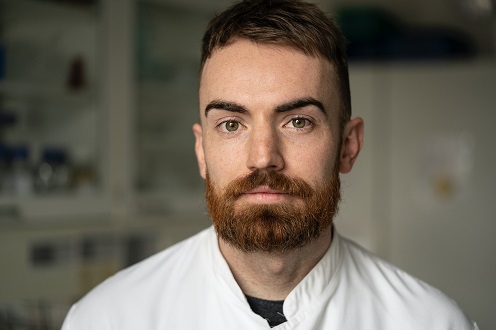PhD defense by Victor Forman
It is with great pleasure we announce the PhD defense by Victor Forman!
Title: Biosynthesis of ginkgolide intermediates and other complex plant diterpenoids
The defense will take place on June 25 at 16:00 in Festauditorium (Aud 1.01) at Bülowsvej 17. You are welcome to attend by showing up here (there is room for maximum 71 people) or by joining via Zoom (https://ucph-ku.zoom.us/j/68395761833 ).
Supervisors: Professor Birger Lindberg Møller, Professor Sotirios Kampranis and Assistant Professor Irini Pateraki.
Assessment committee: Professor Joerg Bohlmann (University of British Columbia), Vice President of R&D Kirsten Benjamin (Amyris Inc.) and Associate Professor Fernando Geu-Flores (University of Copenhagen (chair)).

Summary: Specialized metabolites from plants remain untapped resources of potent drugs, food ingredients or other bioproducts in many cases due to their low availability. Recent progress within biotechnological areas create new alternative sources of these valuable molecules, namely through engineered microorganisms. Plant diterpenoids are one class of specialized metabolites where efficient microbial cell factories may replace unsustainable plant sources. However, creating these alternative microbial sources requires elucidation of the plant enzymatic steps that produce the metabolites of interest, and furthermore a thorough understanding on how to reach efficient enzymatic activity in the engineered microbes.
In my PhD project, I investigated two interconnected research topics: i) elucidation of the enzymatic steps leading do the medicinal diterpenoids called ginkgolides from the iconic "living fossil" tree Ginkgo biloba, and ii) how to improve production of complex plant diterpenoids in yeast cell factories involving cytochrome P450 enzymes.
In my search for enzymatic steps that are involved in the biosynthesis of ginkgolide in G. biloba, I discovered a unique clustering of six, ginkgolide relevant genes in the G. biloba genome. Five of these genes catalyzed four enzymatic steps in the biosynthesis of the ginkgolides. I additionally characterized another gene located far away from the cluster, which catalyzed a fifth step in the biosynthesis of the ginkgolides. The discovered enzymatic steps involved evolutionary old cytochrome P450 enzymes with novel enzymatic activities that shed light on ancient terpenoid biosynthesis. The identified enzymatic steps and the remaining to be discovered will in future enable biotechnolgical production of ginkgolides in microbes.
I improved production of complex diterpenoids in yeast cell factories by two approaches, both involving cytochrome P450 enzymes. Firstly, I used site-directed mutagenesis in specific areas of cytochrome P450 enzymes, which unlocked higher production of diterpenoids in yeast cell factories. Secondly, I identified a class of enzymes called cytochrome b5s to improve enzymatic activities of cytochrome P450 enzymes, leading to industrial level production of a complex diterpenoid in yeast cell factories.
The engineering tools and strategies developed in my PhD thesis will assist new research projects to efficiently engineer both N. benthamiana and S. cerevisiae. My discoveries of new important functional roles of cytochrome b5 and catalytic properties of cytochrome P450 in natural product synthesis will be of general interest to the plant research community. The presented results will additionally help guiding new pathway elucidation studies, and how to improve heterologous diterpenoid production in engineered of microbes.
